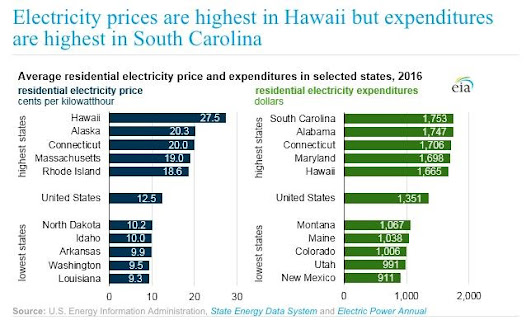 |
The cost of energy in Connecticut is very high, relative to other states. A piece in CTMirror, reprinted in the Hartford Courant, tells us that both Democrats and Republicans want to reduce energy costs.
“Republican state legislators,” according to CTMirror, “are
closing in on a strategy leaders say would chop $125 or more yearly off
Connecticut residents’ rising electric bills.” The strategy is to use a portion
of Connecticut’s swollen budget surplus to pay off costs incurred by the
state’s two energy suppliers, Eversource and United Illuminating. Eversource supplies the bulk of energy to
Connecticut consumers.
Democrats say the GOP solution is fraudulent and politically
convenient in an election year when everyone is suffering from high prices.
Neo-progressive Martin Looney, Democrat leader in the Senate, is quoted in the
piece: “Republicans have had ‘almost a religious adherence to the guardrails,’
and now, two and a half months before the election, they’re willing to jettison
it for something they think will give them a political advantage. They’re
basically taking a position of convenience.’”
And Democrat leader in the House Matt Ritter is piping the
same tune: “But Ritter noted the Republicans would circumvent the guardrails
and pay $300 million to electric companies to save families — by the GOP
leaders’ own estimates — about $12 per month. And the speaker said his office
believes the actual savings would be closer to half of that amount. ‘It fails
the common-sense test,’ Ritter said, adding that he believes Republicans are
groping for an issue because their presidential nominee, Donald Trump, is
projected to run very poorly again in Connecticut. ‘When you are desperate for
an issue, you propose things that don’t make sense.’” The guardrails are a
Republican initiated device to cap spending in the state.
It is the ambition of state Democrats, thus far successful,
to weave Trump’s name into every political discussion, relevant or not, perhaps
to avoid increasingly difficult defenses of Vice President Kamala’s past
domestic and foreign policy measures.
The usually perceptive author of the piece, Keith M.
Phaneuf, has missed the irony of the objections. Looney, Ritter and many other
Democrats in the state’s General Assembly opposed the guardrails, essentially a
cap on spending. Forcing the guardrails down their throats was a bit like
pouring a pint of castor oil down the collective neo-progressive gullet. The
state’s swollen surplus is a measure of the success of spending
guardrails and, of course, Democrats, who enjoy an almost veto-proof majority
in the General Assembly, have been hard at work ever since transferring the
surplus to favored constituencies.
At the very least, we have here a case of the pot calling
the kettle black. The real difference between Democrats and Republicans on the
issue of the surplus is that Democrats want to use the increasing over-taxation
cache to benefit important minority interests, principally state employee
unions, while Republicans want to use a portion of the surplus to benefit all
energy consumers, a much larger, less differentiated group of voters.
The decisive question is: Why shouldn’t the whole surplus be
returned to state taxpayers? A surplus is, after all, an intentional overcharge
on state taxpayers. If I buy a loaf of bread from my local grocer and notice I
have been overcharged, the proper remedy is to bring the bread and bill back to
the store for a refund.
Speaking of bread and bills, this writer has often noted
that we may count on the fingers of one hand lofty speeches in Connecticut’s
General Assembly protesting the high cost of excessive spending. We know
spending waltzes hand in hand with inflation.
Cumulative inflation during the
President Joe Biden/Vice President Kamala Harris administration is about 18%.
Inflation, a devaluation in the purchasing power of the dollar, is caused
wholly by politicians who 1) print money, 2) borrow money excessively, 3) accumulate
massive debt, and 4) transfer spending debt to future generations while lying
through their teeth to their constituents about the predictable consequences of
1,2,3 and 4.
The cost of inflation is reflected in the high cost of goods
and services and can be reduced only through spending retrenchment. It is the
business of an alert, informed media to prevent the kind of confusion that drifts
like a toxic cloud of unknowing through most stories on inflation and high
energy prices.
Public confusion is the most effective instrument in the
tool box of autocratic politicians. We know that companies are not tax payers;
they are tax collectors. They collect the mounting cost of excessive
regulations from their consumers and pass it on in the form of higher prices.
Like love, energy is wonderfully mixed in all our
calculations. When you buy a loaf of bread, you are buying the costs incurred
by companies – note the plural – that put the bread on the table. Inflation, a
hideous tax because it is hidden, is passed along to consumers, as are other
taxes and the costs of regulations.
Connecticut state Democrat politicians, committed to a
future in which the internal combustion engine shall be a distant memory, have
required energy companies to collect the tab for conversion to an all-electric
car market. But – in an astounding reversal of past practice – the state has
agreed to reimburse energy producers for costs they have imposed on energy
producers by passing a portion of the state tax over-charge to politically
tormented energy producers. This is not a solution to a problem. It is a new
non-solution to a problem that produces new, more confusing problems. Utopian
visions are always beset by new problems the cost of which is usually borne by
bewildered taxpayers.
Comments